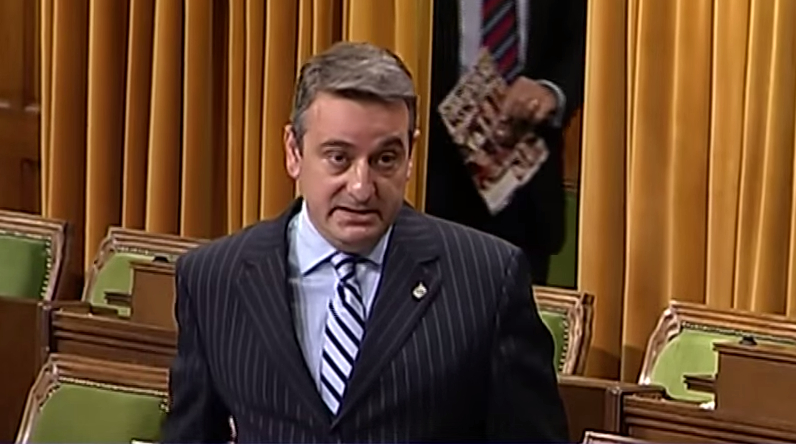Do you want to see more independent reporting from Parliament? Please chip in now to keep rabble.ca on the Hill!
On Tuesday night the House of Commons voted down an NDP motion that would have made Parliament a little more serious and relevant to the concerns of Canadians.
The motion, proposed by Official Opposition House Leader Peter Julian, pertained to government behaviour during the daily Question Period.
Had it passed, Julian’s motion would have given the Speaker the authority to assure that when government ministers and parliamentary secretaries answer questions they address the subject matter at hand.
It almost boggles the mind, but there is presently no rule to oblige members on the government side to, at the very least, make a nominal effort to answer questions. They can say whatever they want, and they often do.
The vote on Tuesday night was close. Three Conservative members actually voted with the NDP on this one, but it still lost by twelve votes, 144 to 132.
The Speaker already has the power to control questions
The main Conservative argument against the motion was that it was “one-sided.” It imposed rules on those who answer questions, not on those who pose the questions.
On the surface that is a plausible argument.
However, the fact is that there are already rules about questions. They must deal with the business of government, for instance.
The “business of government” is a fairly broad category. But over the years Speakers have regularly ruled questions out of order because they strayed too far from what is relevant to the federal government’s administration of the country’s affairs.
During the heated back-and-forth exchanges on the Senate scandals, Speaker Andrew Scheer even mused at one point that a question from Official Opposition Leader Tom Mulcair did not seem to deal with government business, because it pertained to the political activities of the Prime Minister’s Office.
Tom Mulcair did not take that lying down, and the Speaker backed down.
Scheer did not back down on Tuesday afternoon, however, when Saskatchewan Conservative Brad Trost tried to ask a question about happenings at a Parliamentary Committee – the Procedure and House Affairs Committee.
Scheer was unequivocal.
“I am afraid that question would be out of order,” he said. “Questions for committee chairs are very limited to certain parameters and I do not know that this question falls within them.”
Indeed, under the current rules, Speakers now have all the power they need to discipline questioners, and the Conservatives know that full well. The NDP motion would have leveled the playing field a bit by giving Speakers some latitude to compel the government side to at least respect the content of questions.
Parliament is not a courtoom
Readers have asked this writer, on more than one occasion, why the Speaker routinely lets Conservative ministers and parliamentary secretaries get away with murder by flagrantly avoiding questions.
Why doesn’t he compel them to answer, they ask, as a judge in courtroom does to a witness?
The fact is that the House of Commons is not a courtroom and the Speaker is not a judge. Parliament is a deliberative, legislative body, without formal accused and accusers, and it would not be healthy for democracy to turn it into a bad imitation of a courtroom
The NDP motion had no such intent. It would not have turned Speaker Scheer into a judge. Its purpose was to give Scheer the tools he needs to keep government members on topic.
Ironically, the Speaker has such tools when it comes to House debates (as opposed to Question Period). Those rules state that all members must speak to the subject matter at hand, to the bill or motion being considered in debate, and Speakers routinely call members to order for digressing too far.
Still, the fact that the issue of government side non-answers got this far is a minor miracle.
When the Prime Minister’s Parliamentary Secretary, Paul Calandra, gave his now famous passive-aggressive response, the NDP Leader could have let it pass with an apposite comment about how the Prime Minister’s hapless stand-in seems to be hard of hearing — or something on those lines – and left it at that.
Instead, Mulcair chose to shine a light on Calandra’s outrageous behaviour by, in effect, accusing the Speaker of lacking neutrality. That turned a minor, almost banal, daily occurrence into a major brouhaha.
Indeed, the Conservatives probably thought they had a good attack line against Mulcair and his party in accusing them of being insufficiently supportive of Israel.
They hoped that the obscure Facebook comment of a virtually unknown person might become the story of the day, not Calandra’s failure to respect a serious question. Their strategy was to exacerbate well-known rifts in the NDP over its stance toward Israel.
It did not work this time, however, because Mulcair’s original question was so simple, straightforward and unencumbered by partisan rhetoric.
It’s one thing for government MPs to return partisan fire with partisan fire. It is quite another for them to outright ignore important questions about Canada’s going to war.
And so, even though it lost the vote, the Official Opposition won the battle for public opinion on this one.
Image: CPAC



